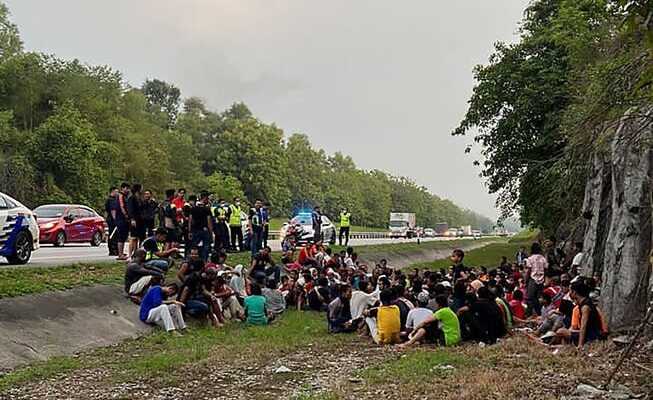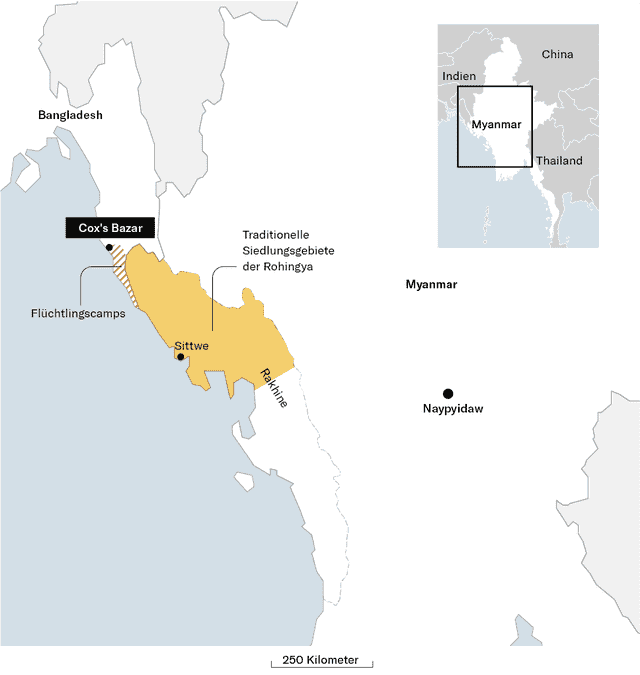For a long time, Malaysia was considered a safe haven for the persecuted Rohingya. But since the corona pandemic, they are no longer welcome – instead, they are locked up as “illegals”, attacked and mistreated.
Police in Malaysia are picking up hundreds of Rohingya refugees who have fled a detention center in the north of the country.
On Wednesday night, 528 refugees from the Rohingya Muslim minority had had enough. Conditions in the Malaysian detention center had become untenable. she stormed the gates and ran away. Most of them didn’t get very far, though. Without shoes and with small children, a quick escape was unthinkable.
As of Thursday, the Malaysian authorities had already taken more than 400 Rohingya refugees into custody. Six people paid for the escape with their lives. They died trying to cross an expressway in the early hours of the morning. Two children were among the victims.
The common religion is attractive
A total of 664 refugees from Myanmar were interned in the affected camp. Most of them had traveled from Bangladesh on tugboats and were stranded on the Malaysian island of Langkawi. From there, the authorities took them to a camp in the north of the country in the border area of the states of Kedah and Penang.
According to the UN High Commissioner for Refugees, there are currently 103,000 Rohingya in Malaysia. However, the actual number is likely to be significantly higher.
Bangladesh, as a direct neighbor of the Myanmar province of Rakhine, where the majority of the Rohingya once lived, is bearing the heaviest burden of the wave of refugees. Since 2017, when the Myanmar military began cracking down on the Muslim minority around 742,000 Rohingya fled to the neighboring country.
South Asian Bangladesh is a dangerous tugboat route more than 1000 nautical miles away from Malaysia. The Muslim country nevertheless exerts an attraction on the Rohingya because of the common belief. Malaysia was considered a safe haven for the Rohingya and was open to the Muslim fellow believers at the beginning of the wave of refugees. Former Prime Minister Najib Razak had strongly condemned the atrocities committed by the Myanmar military and said one should not remain silent.
Without education, without rights, used as forced labourers: why the Rohingya were expelled from Myanmar.
However, the tide has turned in Malaysia with the pandemic. The former Defense Minister and current Prime Minister Ismail Sabri Yaakob had agitated against the refugees from Myanmar almost two years ago. They are not welcome in Malaysia and are being sent back to Bangladesh. They weren’t empty threats. In June 2020, the Malaysian Navy turned away 22 boats carrying 140 refugees and sent the Rohingya back to South Asia.
How much yourself changed the mood, also show hate speech on social networks. Outside a mosque in Johor state near the Singapore border a banner with the inscription stretched: «We do not welcome the Rohingya. We don’t need you here.”
The pandemic has fueled anti-refugee xenophobic sentiment in Malaysia. Many Malaysians fear that the unwelcome immigrants are spreading the virus. In addition, the poor economic situation has a depressing effect. The refugees are perceived as competition on the labor markets.
More than 500 Rohingya are trying to escape from a detention center in Malaysia.
life in a legal vacuum
Beyond xenophobic tendencies, refugees in Malaysia face great difficulties. The Southeast Asian country is not a party to the 1951 Convention on the Status of Refugees and its Protocol of 1967. Malaysia grants asylum seekers and refugees temporary custody so that they can travel to a third country or return home. However, you have no legal residence status.
The asylum seekers and refugees are not allowed to work. Because of their status as illegal immigrants, Myanmar Muslims have to find shelter in the informal sector. They are also denied access to the Malaysian education and healthcare system. In such a legal vacuum, women and children are at greater risk of being sexually exploited – and as victims, they have no chance of reporting the incidents to the police or the judiciary. For the Rohingya, Malaysia is about survival.

